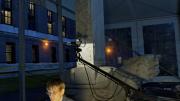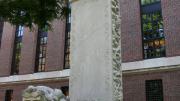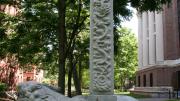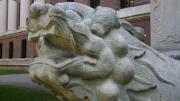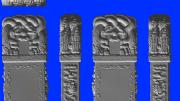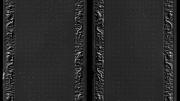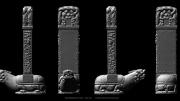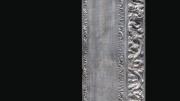On a campus with few public works of art, the monumental Chinese stele—17 feet tall, weighing in at 27 tons—would seem hard to miss. Yet it has been sadly neglected in the shadows along the western flank of the massive Widener Library. Its identifying sign is missing, its black paint is long gone, and even its inscription is in danger of disappearing as the marble corrodes. (Although covered in winter, the stone is deteriorating.)
At risk is a significant history—Chinese and Harvardian. The stele itself, dating to c. 1820, stood in the Yuan Ming Yuan (the Old Summer Palace), in northwestern Beijing, until the complex was destroyed in 1860, during the Second Opium War. It came to Harvard in 1936, a Tercentenary gift from Chinese alumni, who had a new inscription carved, expressing their admiration for the University and appreciation for their education. By then, there were nearly 1,000 Chinese alumni, the text notes; according to a contemporary translation, its donors expressed the “fervent hope” that “in the coming centuries the sons of Harvard will continue to lead their communities and that through the merging of the civilization[s] of our countries, intellectual progress and attainments may be further enhanced.” But there were interruptions: China was about to suffer a catastropic invasion by Japan, internal collapse, and the endgame of the brutal civil war that resulted in the victory of the Communist Party. (Times continue to change; today, China sends more international students to the University than any other country.)
In past decades, a Straus Center conservator, faculty members, and even a graduate student have sought a better fate for the monument. In their wake, Jeffrey R. Williams ’78, M.B.A. ’82, the executive director of the Harvard Center Shanghai, began championing the cause some years ago, when he was president of the Harvard Club of the Republic of China. As a first step, this September, the center and the Harvard China Fund—in concert with the Peabody Museum of Archaeology and Ethnology—arranged for the stele to be documented in virtual form via high-definition, three-dimensional scanning—the project shown under way here.
